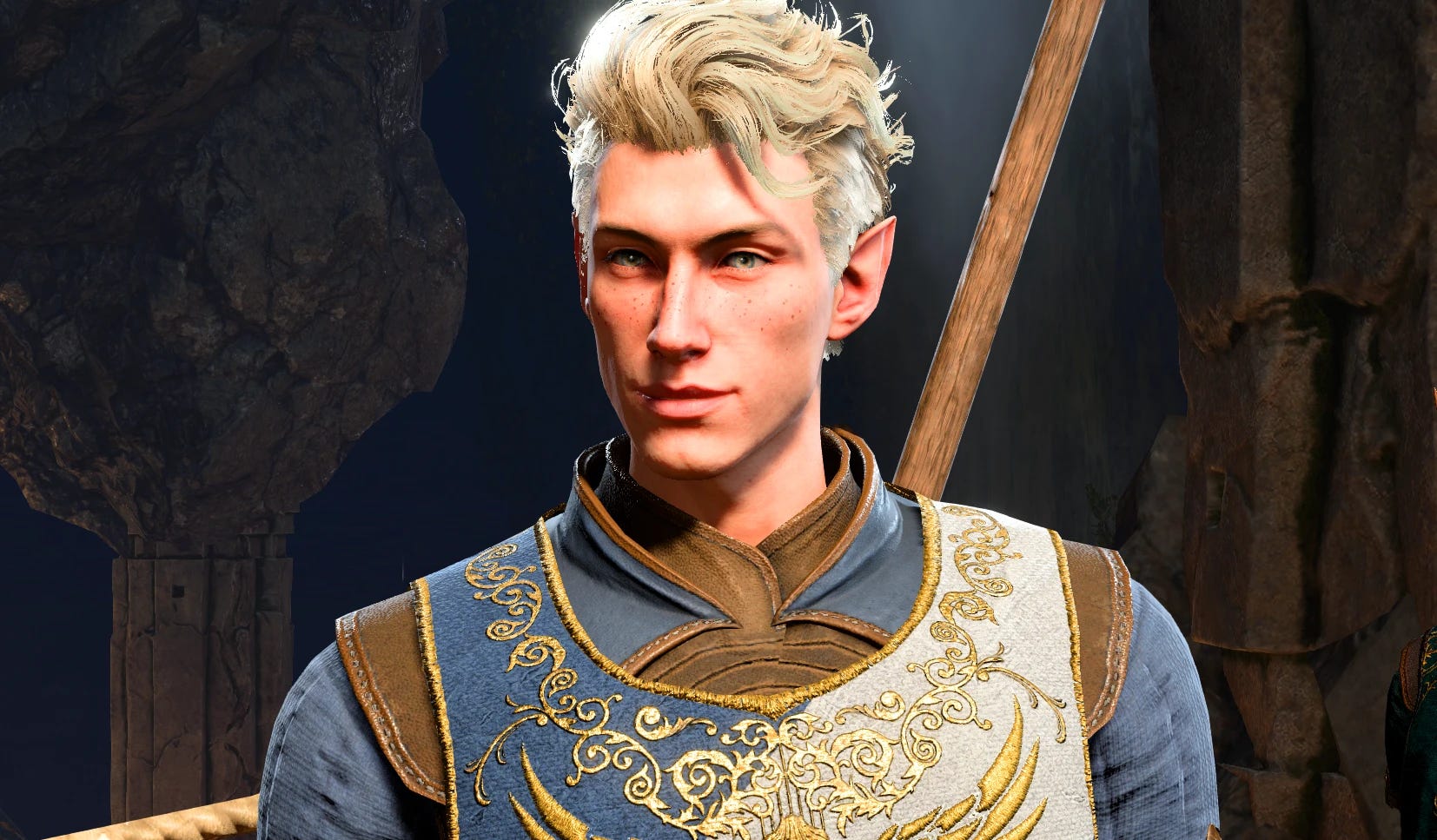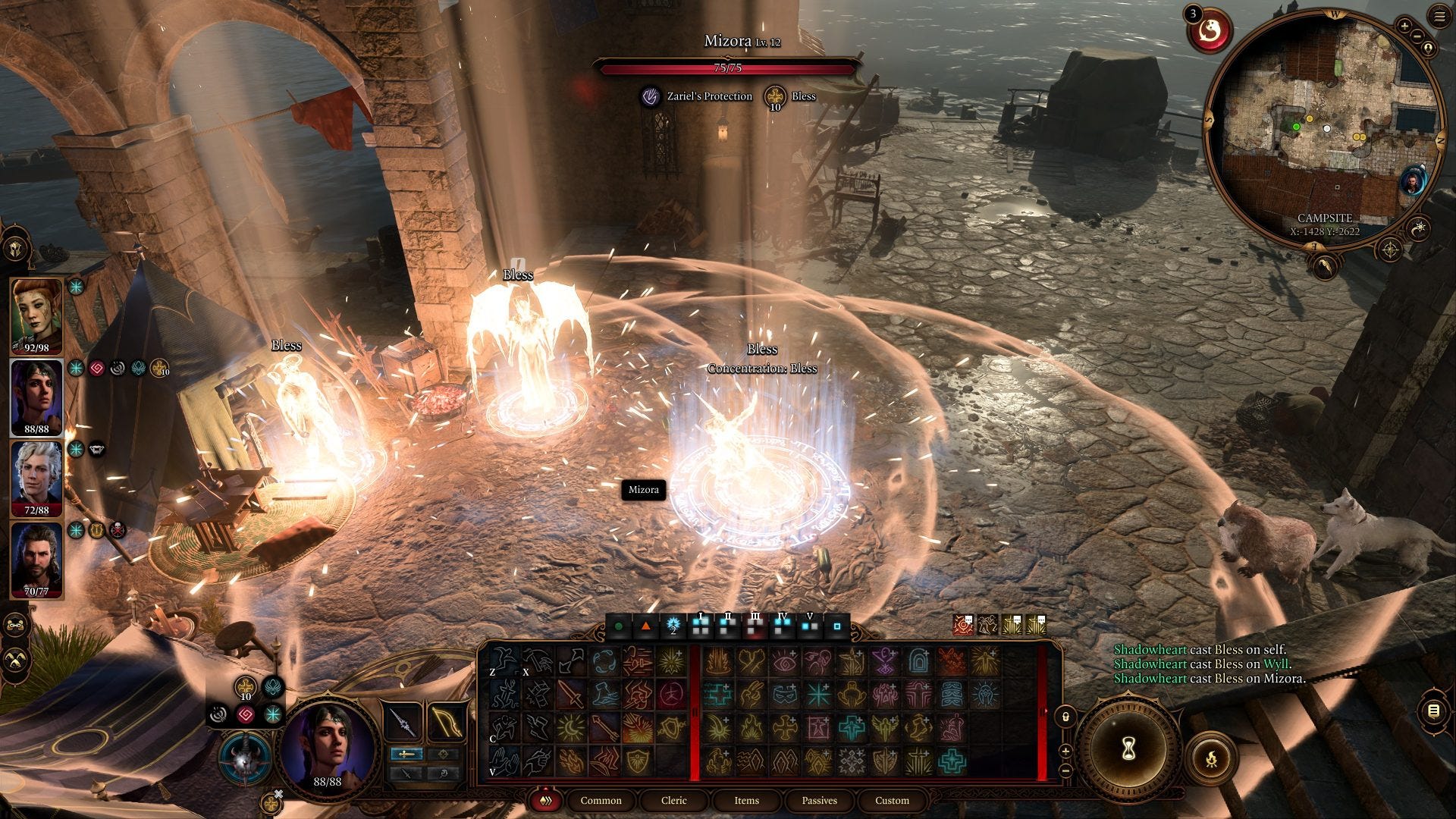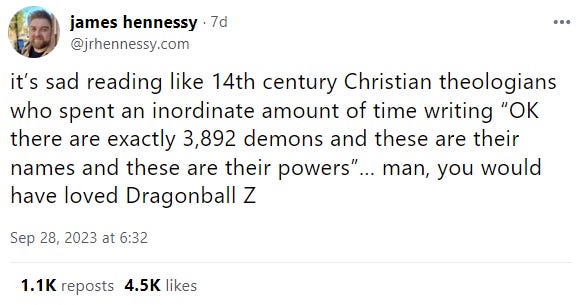My Baldur’s Gate 3 theological crisis
Also, it's about ethics in games (and the ethics we impose on them)
Modern Relics is a newsletter that forensically picks through the bits left at the crash site where religion and pop culture had a head on collision.
The vibe is like:

Hey sorry for not posting last week. I totally would have, but I think it would have killed me. Rest assured my commitment to the newsletter bit is very high, but sometimes I feel overwhelmed and need to take a week off here or there.
I think I spent the time playing Baldur’s Gate 3, which is a video game based on Dungeons and Dragons 5th edition, so I’m going to write about that here. Actually this whole post is going to be about games.
I’m having a theological crisis in Baldur’s Gate 3
As you know, I’ve been playing Baldur’s Gate 3. I’m playing a Cleric of Lathander with an acolyte background (typical!!) so I get a little bonus in game whenever I make my character play to type and do something religion-y.

The way the game treats this mechanic is a bit weird to me, because I get bonuses even when I do stuff that should absolutely be against the tenets of my faith.
For example, I came across a goblin imprisoned in a goblin encampment — unusual! When I spoke to him, he told me that all of his clanmates had abandoned their old god Maglubiyet to follow some newfangled deity. He refused to apostatize, and so was locked in a cage dangling over a bottomless abyss.

My character knows that Maglubiyet is a cruel and evil god who only wants to conquer and destroy, but figures the goblin knows the encampment and might help in the battle ahead (or tell me a helpful secret.) So I free the little guy, only for him to run off saying he’s off to find another tribe who will pillage and murder — in the traditional way. I still got my bonus… for respecting his religion I guess?
The world of Baldur’s Gate 3 is polytheistic, and there’s absolutely no question the gods are real. They directly aid their followers with magic and sometimes even send their avatars to affect the world. The gods feud and form alliances with each other. They try to manipulate things to maximise the number of people who worship them, because in this world more prayers equals more power.

My character is a devotee of a good god of life, light and new beginnings, yet I’ve directly aided an enemy deity and have unleashed an evil onto the world (a small one, but still!) Later in the game I not-so-inadvertently evangelised on behalf of the evil spider goddess Lolth under similar circumstances.
Again I got a bonus. The game wants to reward me for role playing my very religious character as very religious, but it’s extremely agnostic about which god I act on behalf of, or if my actions align with my deity’s precepts.
For a game with unmatched attention-to-detail in almost every other way, I just think that’s weird! It’s still game of the year though.
More on fantasy polytheism
If you’re interested in fantasy religion, I recently found this video by The Grungeon Master. He says pantheons in settings like Dungeons and Dragons aren’t observed in the same way as real-world polytheism.
Essentially, because followers get real and obvious power from a specific god, it encourages characters to worship one god above others, even though it’s obvious those other god are real and powerful too. Whereas in real life, polytheists tend to worship pantheons as a whole, switching worship to whichever deity was right for their particular situation.
I’m actually not sure if I agree, but it’s interesting to think about!
The first game

It’s about ethics in games (and the ethics we impose on them)

I really enjoyed this article in the Guardian by Amelia Tait about having particular moral hangups in games — even ones that don’t have “good vs evil” ethical systems like Zelda: Tears of the Kingdom, or PowerWash Simulator.
[E]very animal in Tears of the Kingdom is made entirely of code. Morally and materially, there is no difference between shooting a wolf and clubbing an enemy to death with a boulder attached to a stick (in the game, I repeat, in the game). Yet somehow, many of us find one of these actions emotionally easier than the other. Why exactly is this, and what other ethical limitations do gamers set for themselves?
I actually do find it difficult to do certain actions in video games, at least the first time I play them. On my second playthrough I can decide I’m doing an “evil run” and I’ll role play as an evil monster. But if my actions in game were morally real, I’d have already caused myself moral injury in my “good” playthroughs by killing my enemies! So who cares if I do bad things the first time around! But somehow it still matters.

I will go to gamer heaven but you know it smell crazy in there.
Context: Shoshana is a teacher in a Jewish school



Different kind of game

Lastly, not gamer content but it has the same vibe

Spread the good word to a gamer you know and love (or at least tolerate).

